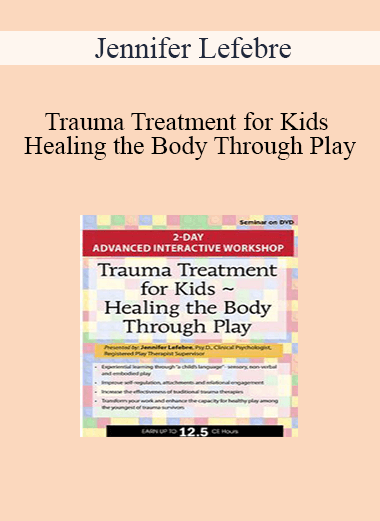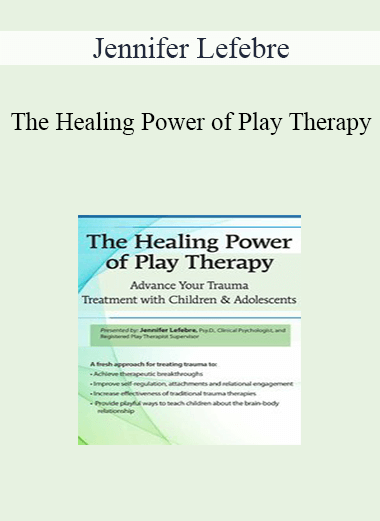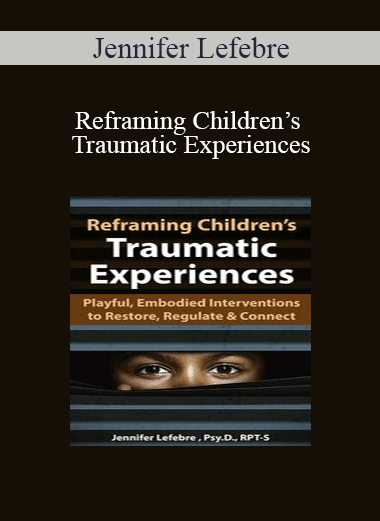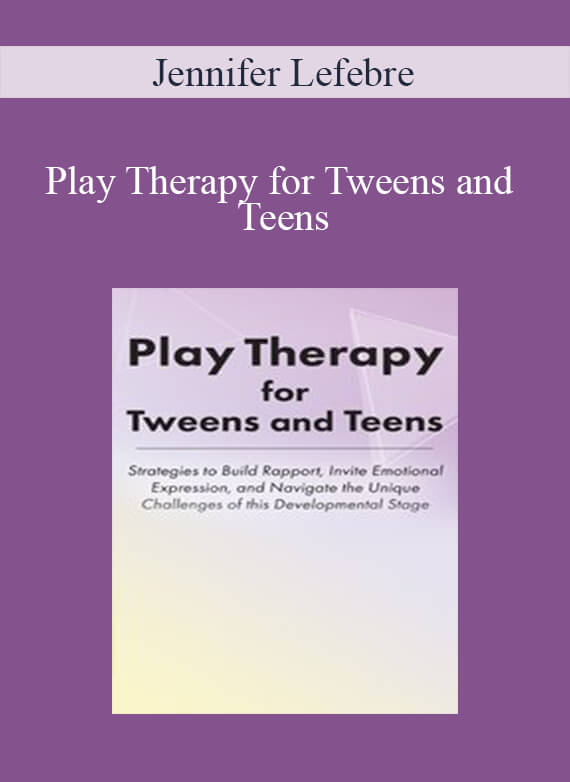[Download Now] Trauma Treatment for Kids – Healing the Body Through Play: Advanced Interactive Workshop – Jennifer Lefebre
$299.00 Original price was: $299.00.$75.00Current price is: $75.00.
[Download Now] Trauma Treatment for Kids – Healing the Body Through Play: Advanced Interactive Workshop – Jennifer Lefebre
Product Delivery: You will receive a download link via your order email immediately
Should you have any question, do not hesitate to contact us: [email protected]
[Download Now] Trauma Treatment for Kids – Healing the Body Through Play: Advanced Interactive Workshop – Jennifer Lefebre
Sale page_https://catalog.pesi.com/item/30357/
Archive: https://archive.fo/VC7HE
- Experiential learning through “a child’s language” – sensory, non-verbal and embodied play
- Improve self-regulation, attachments and relational engagement
- Increase the effectiveness of traditional trauma therapies
- Transform your work and enhance the capacity for healthy play among the youngest of trauma survivors
Traumatic events damage children emotionally and psychologically.
Their trauma stays trapped in their body – they feel overwhelmed, they don’t sleep, they’re anxious, depressed, failing in school, angry and socially isolated.
They are completely vulnerable.
How do you as a therapist get to the root of their pain? What do you do when words and language can’t be accessed, when conventional treatments aren’t enough?
Play is a child’s natural way to expose their trauma, formulate their narrative and begin to process the trauma.
Join trauma expert, Dr. Jennifer Lefebre in this experiential, interactive workshop and learn to speak the language of traumatized children!
- Integrate play therapy with trauma treatment to provide children engaging, developmentally appropriate and empirically validated treatment
- Use essential components of trauma treatment flexibly combined with sensory, non-verbal and embodied play to address interest and advance your work with kids
- Creative and effective treatment strategies to improve self-regulation, attachments and relational engagement, integrate traumatic experiences and build a sense of competence and worth
- Access a clinical framework to incorporate trauma theory, neuroscientific research and play therapy principles
- Increase the capacity for healthy play among the youngest of trauma survivors
- Articulate how to help children with complex trauma histories restore their capacity for playfulness and co-regulation.
- Evaluate the fight-or-flight response in children, and learn playful ways to teach children about the brain-body relationship.
- Communicate the neurophysiological theory behind developmental trauma and attachment.
- Contrast diagnostic challenges within this population, and ascertain symptoms of post-traumatic stress disorder which can be decreased through embodied play therapy strategies.
- Combine embodied play therapy interventions with evidence-based treatment models for improving emotional and behavioral regulation.
- Pair the core components found within the leading evidence-based trauma treatments (TF-CBT, EMDR, CPP, ARC, TARGET) with play therapy techniques to improve relational engagement.
- Evaluate which trauma informed treatment components “fit” with specific needs of children who have experienced developmental trauma.
- Determine how core components of childcentered play therapy align with best practices for treating childhood trauma.
- Help children heal from trauma through play therapy and evidence-based cognitive strategies.
- Implement play therapy techniques that are consistent with the core components of trauma-informed treatment.
- Develop a treatment plan for introducing play therapy to clients and families in an engaging, fun manner.
- Integrate culturally attuned play therapy strategies into trauma work with children and families.
- Neuroscience of Childhood Trauma Trauma Theory
- Fight-or-Flight (parasympathetic/sympathetic nervous system)
- Attachment Theory
- Assessment
- Complex Trauma
- Post-traumatic Stress Disorder
- Reactive Attachment Disorder
- Developmental Trauma Disorder
- A new conceptualization and integrated clinical framework
- Essential Components for Trauma-Informed Treatments
- Establishing safety and a sense of competence/worth
- Appropriate attachments & relational engagement
- Self-regulation (body & emotions)
- Self-reflection & Introspection
- Integration of traumatic experiences (acknowledgment & processing of the trauma)
- Future safety ~ transitioning beyond the Trauma
- Body Based Treatment – Emotional and Behavioral Regulation
- Verbal vs nonverbal responses – how to recognize trauma without verbal report
- Bottom-up versus top-down processing – trauma starts in the body
- Developmental needs of traumatized children
- Embodied play & sensory integration – emotional and behavioral regulation
- Incorporating Play Therapy into Proven Evidence-based Treatments
- Components that “fit” the child’s specific needs
- TF-CBT- Trauma focused Cognitive Behavioral Therapy
- EMDR – Eye Movement Desensitization and Reprocessing
- CPP – Child Parent Psychotherapy
- ARC – Attachment, Regulation, and Competency
- TARGET – Trauma Adaptive Recovery Group Education Therapy
- Play Therapy Principles
- Therapist establishes a friendly relationship
- Accepts the child as he is
- Creates a permissive relationship; child has freedom of expression
- Validates (acknowledge and reflect) child’s feelings
- Responsibility for decisions and change is left mostly to the child
- Child directs the therapeutic process; therapist follows
- Therapeutic interaction is not rushed
- Limits are set only when necessary for child’s outcomes
- Advancing Trauma Treatment with Play Therapy
- Non-verbal techniques
- Sensory-based techniques
- Culturally and developmentally appropriate techniques
- Play Therapy Strategies and Techniques
- Integration of traumatic experiences to acknowledge and process the trauma: Sandtrays, drawings, & play
- Target shame, self-doubt, and selfcompassion: Sandtray Safeplace & All About Me
- Build an understanding of the brainbody relationship: Flip your lid and Charades
- Target indiscriminate attachments and interpersonal reactivity: Invisible String & Family Sandtray
- Improve emotional and bodily regulation: Stressballs, Be Spaghetti, Feelings Map, Trashballs, Yoga, and Weather Massage
Tag: Trauma Treatment for Kids – Healing the Body Through Play: Advanced Interactive Workshop – Jennifer Lefebre Review. Trauma Treatment for Kids – Healing the Body Through Play: Advanced Interactive Workshop – Jennifer Lefebre download. Trauma Treatment for Kids – Healing the Body Through Play: Advanced Interactive Workshop – Jennifer Lefebre discount.
Delivery Method
– After your purchase, you’ll see a View your orders link which goes to the Downloads page. Here, you can download all the files associated with your order.
– Downloads are available once your payment is confirmed, we’ll also send you a download notification email separate from any transaction notification emails you receive from IMC.sale.
– Since it is a digital copy, our suggestion is to download and save it to your hard drive. In case the link is broken for any reason, please contact us and we will resend the new download link.
– If you cannot find the download link, please don’t worry about that. We will update and notify you as soon as possible at 8:00 AM – 8:00 PM (UTC+8).
Thank You For Shopping With Us!
Be the first to review “[Download Now] Trauma Treatment for Kids – Healing the Body Through Play: Advanced Interactive Workshop – Jennifer Lefebre” Cancel reply
Related Products
Medical & Health
Medical & Health
Medical & Health
Medical & Health

![[Download Now] Trauma Treatment Using Nonverbal](https://imc.sale/wp-content/uploads/2022/02/Trauma-Treatment-Using-Nonverbal-Play-and-Somatic-Techniques-Resolving-Therapeutic-Stuckness-–-Monica-Blum-100x100.jpg)
![[Download Now] Trauma Treatment Course: Mind-Body Integration Techniques for Healing Trauma](https://imc.sale/wp-content/uploads/2022/02/Trauma-Treatment-Course-Mind-Body-Integration-Techniques-for-Healing-Trauma-PTSD-and-Grief-–-Michael-Prokop-100x100.jpg)
![[Download Now] Trauma Treatment for Kids – Healing the Body Through Play: Advanced Interactive Workshop – Jennifer Lefebre](https://imc.sale/wp-content/uploads/2022/02/Trauma-Treatment-for-Kids-–-Healing-the-Body-Through-Play-Advanced-Interactive-Workshop-–-Jennifer-Lefebre.jpg)
![[Download Now] The Healing Power of Play Therapy: Advance Your Trauma Treatment with Children & Adolescent – Jennifer Lefebre](https://imc.sale/wp-content/uploads/2022/02/Pre-Order-The-Healing-Power-of-Play-Therapy-Advance-Your-Trauma-Treatment-with-Children-Adolescent-–-Jennifer-Lefebre.jpg)




![[Download Now] Trauma Treatment for Kids – Healing the Body Through Play: Advanced Interactive Workshop – Jennifer Lefebre](https://imc.sale/wp-content/uploads/2022/02/Trauma-Treatment-for-Kids-–-Healing-the-Body-Through-Play-Advanced-Interactive-Workshop-–-Jennifer-Lefebre-100x100.jpg)
8 reviews for [Download Now] Trauma Treatment for Kids – Healing the Body Through Play: Advanced Interactive Workshop – Jennifer Lefebre
There are no reviews yet.